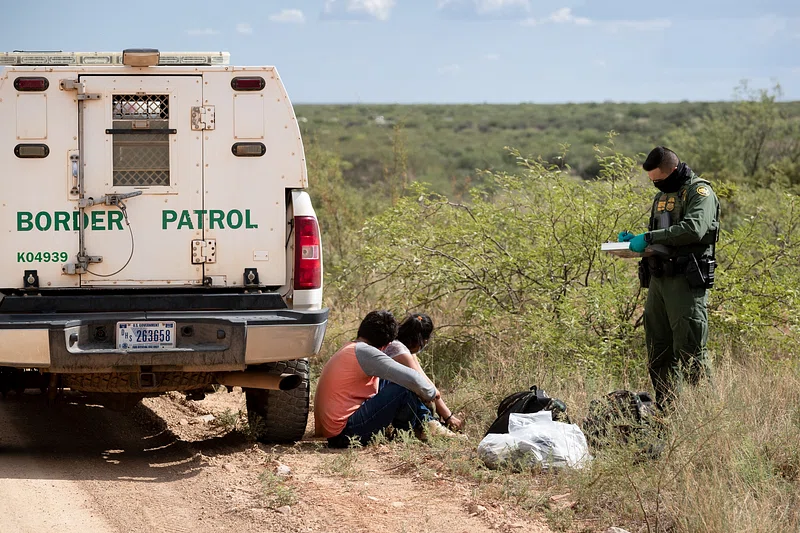This article was originally published by Radio Free Asia and is reprinted with permission.
Anyone desperate to leave China as part of an ongoing exodus known as the “run” movement may need to find alternate destinations, as the repatriation of Chinese migrants from the United States looks increasingly likely.
China on Monday pledged to accept the return of Chinese migrants in the United States after President Donald Trump threatened to hit Colombia with tariffs of up to 50% for refusing to take back its migrants amid an ongoing crackdown on immigration.
“China will receive people who are confirmed as Chinese nationals from the mainland after verification,” foreign ministry spokeswoman Mao Ning told a regular news briefing in Beijing.
“The Chinese government firmly opposes any form of illegal migration,” she said.
The number of people fleeing China to seek asylum in the United States has spiked sharply since the country eased its zero-COVID travel bans in 2022.
In 2024, the U.S. Customs and Border Patrol reporting encounters with more than 32,000 Chinese nationals at the southwest land border with Mexico compared with about 21,000 the previous year. The agency reported 2,395 so far this year.
Chinese nationals have had a fairly high likelihood of being accepted as political refugees in the United States in recent years, with acceptance rates of around 55%, according to statistics from the Department of Justice.
Dangerous trek
In a phenomenon known as the “run” movement, they have been fleeing the country in large numbers to make the arduous and sometimes dangerous overland journey through South and Central America to cross the border from Mexico and apply for political asylum in the United States.
A buzzword that uses the Chinese character 润 (rùn) as a wordplay on the English word “run,” it describes how large numbers of people are leaving, or researching the best way to get out of China, with the aim of settling in a more developed country with greater freedoms.
The idea of leaving really took off during the grueling lockdowns, mass incarceration in quarantine camps and compulsory testing of President Xi Jinping’s zero-COVID policy, which the government ended abruptly following nationwide protests in December 2022.
Many political dissidents, religious believers and rights activists are among the new wave of migrants, and could face official retaliation if they’re handed over to the Chinese authorities.
Trump has declared illegal immigration a national emergency, dispatching the U.S. military to help with border security and issuing a broad ban on asylum, as well as taking steps to restrict citizenship for children born on U.S. soil.
Destination Japan
That means Chinese asylum-seekers are now at risk of being sent back to China, and people may start looking at alternate destinations — and Japan is becoming a popular option.
Language student Li Bing, who hails from northwestern China, is now working in the industrial waste industry in Japan on a five-year work permit after initially traveling to the country as a language student.
“This was the only company that was pretty straightforward and gave me a job offer,” Li told RFA Mandarin. “So I figured I’d make the best of it.”
“The industry has nothing to do with my previous career in China, and it doesn’t pay well, but the most important things for Chinese overseas are role, language and money,” he said. “This company has solved the most important of those problems for me.”
Li said he plans to apply for Japanese citizenship after working out his five-year visa.
“There’s a huge drop in income and lifestyle, but … I think everyone experiences this when they move to a new environment,” he said. “My understanding of the world and of life have changed … I don’t need to turn myself into the hero guy of my own success story.”
“I have no regrets,” he said.
Chinese are the most numerous newcomers to Japan, the Associated Press reported last September, with 822,000 Chinese passport-holders among more than 3 million foreigners living in the country, up from 762,000 in 2024.
A Reddit comment as early as 2021 extolled the country as a good option for young Chinese people, saying “Japanese is relatively easy to learn … it’s easy to find a job (the birth rate is seriously declining and young people can find jobs if they want them.”
“There is almost no situation in which people are sent back home because they can’t find a job.”
Meanwhile, Taiwan’s Central News Agency quoted an immigration consultancy insider as saying that while Japan is now a likely alternate destination, Thailand and Malaysia are also popular.
Colombian face-off
Mao Ning’s comment was in response to a question about whether China would take back its nationals following a face-off between the Trump administration and Bogota, which had initially refused to accept military aircraft carrying deported migrants, according to the White House.
Colombia backed down after Trump threatened it with tariffs and sanctions for refusing to cooperate with his sweeping immigration crackdown.
“The Government of Colombia has agreed to all of President Trump’s terms, including the unrestricted acceptance of all illegal aliens from Colombia returned from the United States, including on U.S. military aircraft, without limitation or delay,” the White House said in a statement on Monday.
“President Trump … expects all other nations of the world to fully cooperate in accepting the deportation of their citizens illegally present in the United States,” the statement said.

